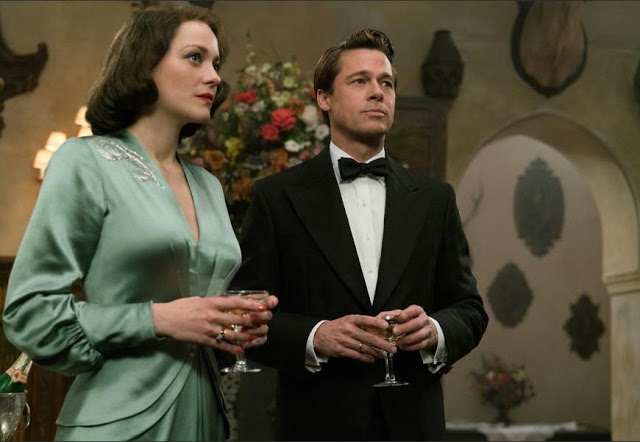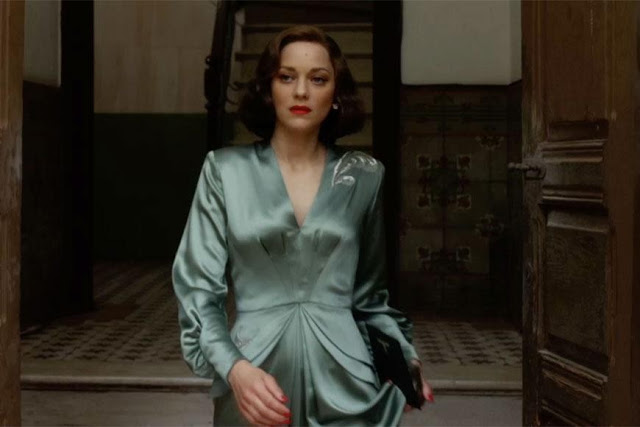Beautiful, enigmatic, tantalizingly seductive, brimming with feeling—am I describing Allied, or Marion Cotillard? Is there a difference? Robert Zemeckis’ World War II thriller has much to recommend it—slick pacing, gorgeous costumes, a taut script by Peaky Blinders creator Steven Knight—but the unequivocal highlight is Cotillard’s hypnotic performance. At once exquisitely graceful and nakedly emotional, the actress effortlessly commands your attention whenever she’s on screen. The only problem with Allied is that she isn’t on screen nearly enough.
A handsome period piece, Allied opens in blinding sunlight, as a lone solider parachutes into the deserted sands of French Morocco. This is Max (Brad Pitt, holding his own), a Canadian intelligence officer on a mysterious assignment. He slips on a wedding ring and makes his way to Casablanca, where he locates his wife, a socialite named Marianne (Cotillard), who in actuality is neither a socialite nor his wife. Instead, Marianne is a fighter for the French Resistance—she and Max, who have never met before, have been tasked to pose as a couple while carrying out a dangerous mission. Knight’s script initially leaves the details of that mission murky, though we know the stakes are high and the odds are low; when Marianne asks Max to estimate their chances of survival, he tersely replies, “60-40. Against.”
The odds of you enjoying this movie are substantially higher, especially during its opening act, which is absolutely electric. Part of this stems from Allied‘s canny decision to keep viewers in the dark about the particulars of Max and Marianne’s plan, which allows Zemeckis to bypass the usual soggy exposition and instead replace it with lively intrigue. Scenes of the duo’s preparation—a meeting with a smarmy German officer, a trip to the desert for some windswept target practice—crackle with tension; you may find yourself nervously leaning forward, desperate to discover the object of their deception.
The greater tension, however, lies in the friction between Max and Marianne, a pretend pairing that nevertheless produces an authentic alchemy of curiosity, anxiety, and heat. Marianne, a specialist in undercover work, insists that they pantomime their fake marriage in exacting detail, just in case anyone’s watching. “I keep the emotions real,” she explains.
Does she ever. In a meta sense, Allied could be perceived as a validation of Method acting, the process by which performers burrow into a false role to imbue it with truth. And Cotillard, in a portrayal that exudes extraordinary intelligence and blistering passion, makes Marianne’s role-playing so persuasive that the line separating actress from character becomes invisible. That’s true of many great performances (including Cotillard’s own work in Rust and Bone and The Immigrant), but the peculiar brilliance of Allied lies in its recursion. Much like we grow to accept a popular actress as a boisterous freedom fighter, Max eventually comes to regard his partner in espionage as his actual wife; in war, and at the movies, acting becomes reality. It’s exhilarating stuff, and Zemeckis stages it with impeccable craft and even a dash of operatic flair. A scene where Max and Marianne make love in a car while surrounded by a swirling sandstorm—because hey, they might die tomorrow, so why not?—would be ludicrous if it weren’t so charged with palpable desire.
Zemeckis can’t sustain this intoxicating rush of feeling forever, and once Max and Marianne faithfully execute their task—in yet another thrilling sequence of danger and death—the action shifts to London, where our war heroes decide to turn their sham marriage into the real thing. At this point, Allied transforms into a much different movie, one that’s still pretty good but is far more traditional. Its basic hook—and if you have avoided the trailer and are wary of spoilers, I advise you to stop reading now—involves newly acquired intelligence suggesting that Marianne is in fact a German spy. To verify this information, the British military—personified by an apologetic CO (Jared Harris, nicely calibrated) and an ice-cold spook in a suit (Simon McBurney, delightfully pitiless)—turns to Max, giving him a grave new assignment with the sinister name of “Blue Dye”. Simply put, Max is to intentionally feed Marianne misinformation. If she declines to act on it, well, no harm, no foul; but if she indeed passes it on to the Third Reich, Max must kill his wife himself or face execution for treason.
It’s an undeniably exciting development that is also something of a miscalculation. Max is understandably agonized to learn that the love of his life may be his mortal enemy, and Zemeckis mines his sudden crisis of faith—in his marriage, his country, his own judgment—for considerable suspense. Simultaneously obeying his superiors’ orders and conducting his own illicit investigation into his spouse, Max finds himself in a classically frantic race against the clock, desperate to find proof of Marianne’s innocence even as he’s terrified of confirming her guilt. His anguish is compelling on its own (Pitt supplements his usual charisma with a pinch of angsty gravitas), but it’s the way Zemeckis weaves in clever little bits of spy craft—a misleading question about earrings, a carefully contemplated pinprick, a decidedly unconventional use for a piece of bread—that truly elevates the film’s already-pounding heart rate.
Yet while Allied‘s is-she-or-isn’t-she dichotomy is suitably gripping, it cannot help but feel diminished in relation to the bracing audacity of its earlier passages. The reason for this is simple: In casting Marianne as a suspect, the movie necessarily turns her into a passive participant in its own shell game. Max’s furtive probe of his wife may levy an existential toll on him, but it also treats Marianne as a binary object, a tossed coin that’s destined to land on either heads or tails. This schematic structure becomes all the more reductive once you consider that Marianne is by far the film’s most fascinating character. She deserves better than to serve as the endpoint of an artfully constructed maze. That’s a role any woman can play, even if Marianne—and, by extension, Cotillard—plays it better than anyone else.
Jeremy Beck is the editor-in-chief of MovieManifesto. He watches more movies and television than he probably should.





Spot on account of Cotillard not spending enough time on screen. She was the heroin. I thought you meant that we as viewers would not see her enough but then read your review afterwards and think that her plotline was left undeveloped when it had such potential. Great review!
Thanks! Yeah, I suppose I meant "on screen" more in terms of point of view than literal screen time. I probably could have made that clearer, but in a movie all about misdirection and mistrust, why make it easy for readers?